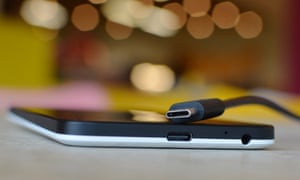 USB-C cables that do not comply with the required specifications, which
have been known to fry computers, smartphones and tablets, are now
banned
USB-C cables that do not comply with the required specifications, which
have been known to fry computers, smartphones and tablets, are now
bannedAmazon has banned USB-C charging cables that do not comply with specifications, awhich are considered dangerous as they can damage devices they are used with and potentially cause safety risks.
which includes a reversible connector that can plug in either way up, was designed as the do-it-all cable capable of charging computers as well as smartphones, tablets and other low-power gadgets.
Amazon’s move sees it acting as a de facto quality control agent for the USB-C cables, helping users steer clear of much needed but sub-standard products. Many USB-C enabled devices come only with USB-C to USB-C cables, not with cables for plugging into older chargers or computers – which commonly have USB-A connections.
Designed under the USB 3.1 specification, USB-C can deliver a larger amount of power than older USB cables allowing them to be used to charge computers such as Apple’s MacBook and Google’s Chromebook, both of which require significantly more power than smartphones do.
To do so, USB-C cables have a 56k ohm resistor that allows the power supply and the device plugged into it to work out the correct power level that suits both ends of the charging party, making sure the device does not draw more power than the plug can supply.
 Unfortunately some USB-C cables have been made with the incorrect
resistor, typically only 10k ohm, which means that it is possible for
the device to draw more power than the plug can safely supply or
potentially for the plug to push more power than the device can take.
Others are wired incorrectly, which could destroy whatever they are
plugged into.
Unfortunately some USB-C cables have been made with the incorrect
resistor, typically only 10k ohm, which means that it is possible for
the device to draw more power than the plug can safely supply or
potentially for the plug to push more power than the device can take.
Others are wired incorrectly, which could destroy whatever they are
plugged into.Russian roulette with USB-C cables
Google engineer Benson Leung has been leading a campaign to try and weed out problem cables, checking them for their specification compliance and singling them out on Amazon. One cable was dangerous enough to the process of testing it.Dead USB ports on computers are also reportedly an increasing problem, where someone has plugged a phone into a computer not capable of providing enough power for its fastest charging rate, using a cable that hid that risk from the smartphone demanding that power.
It’s very difficult to know which cables can be trusted, something that has finally prompted Amazon to clamp down.
The retailer’s new terms specifically state that prohibited listings include: “Any USB-C (or USB Type-C) cable or adapter product that is not compliant with standard specifications issued by ‘USB Implementers Forum Inc’.”
Leung said: “What does this mean? It means that cable manufacturers who sell poorly made or intentionally deceptive USB TypeC cables and adapters are banned from Amazon, officially.
“It’s really great news, but we all have to continue to be vigilant and call out any bad products we find on Amazon and other stores (both online and brick and mortar) as we find them.”
More and more devices supporting USB charging will be sold this year , with the majority of smartphones and tablets expected to use the port. Most will not come with cables that allow these devices to be charged using a standard USB port, meaning third-party cables will play an important role in pushing the universal, reversible cable standard forward.













No comments:
Post a Comment